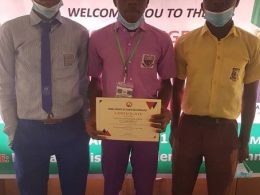LAGOS SPECIAL GRANTS BILL:
The Superior Arguments For.
Senator Oluremi Tinubu may have lost the case for now, due—not to inferiority of arguments, but—to the usual primordial sentiments and undercurrents of the high-wire politics involved.
Rejecting an otherwise good bill is uninspiring enough, our senate should not be throwing the baby away with the bath water over flimsy excuses. This act is a repeat from when President Olusegun Obasanjo —then incumbent—was seeking a ‘third term’: The senate threw away ‘?? constitution amendment’ because of their aversion to the ‘third term’ ploy. Yet again with Senator Tinubu’s bill. A mature senate would always know how to separate Genesis from Exodus. .
Incidentally, Senator Tinubu’s bill would be the second such attempt at seeking special attention for Lagos, at least in this dispensation. Regrettably, both attempts failed. The bill was first presented to the upper chamber in the 7th Senate, but the lawmakers rejected it at the committee stage. The then Deputy Senate President, Ike Ekweremadu-led Senate Ad-hoc Committee on Constitution Review on June 5, 2013, ruled out special status for Lagos. It said in its report: “On special status for Lagos, while the committee appreciates the peculiar needs and challenges of Lagos, it is our considered opinion that according such special status should be a matter of political decision, which should be kept out of the Constitution.”
The bill sought one per cent of federally generated revenue as special grant for Lagos State because of the state’s former capital’s socio-economic significance. According to Senator Tinubu, “Lagos is of a strategic, social, economic significance as the commercial nerve-centre of Nigeria. Today, Lagos serves as the commercial capital of Nigeria and its major nerve-centre. The strategic importance of Lagos is inherent in several sectors of the economy. Available statistics indicate that six out of 10 international passengers arrive in Lagos, while eight out of 10 depart from Lagos. This shows that Lagos is the window through which visitors travel in and out of Nigeria.”
The population of Lagos keeps increasing daily, with many of those coming into the place not returning to their home towns. Even if only for those transiting, the figure is huge. The population of Calabar is put at about 371,022 (2006 census). The population of the whole Cross River State is 3.738million (also 2006 census). On the other hand, the population of Lagos, even at the contentious 2006 estimate, is about eight million; the state government argues that it is more than 16 million, which is more like it, given the number of people the government provides for by way of infrastructure, which is overstretched. This imposes a lot of strain on infrastructural facilities in Lagos. Even many of our representatives and senators find Lagos irresistible as they abandon their dull life in Abuja for the alluring Lagos city life at weekends and during major public holidays.
Lagos deserves more than its current federal allocation. Look at the Value Added Tax (VAT), for instance. The bulk of the tax comes from Lagos. Yet, Lagos does not have the benefit of equivalent returns. If 13 per cent is good for oil-producing communities, why not same for VAT? “By the same token, whatever you get from VAT, a certain percentage should belong to that community. We have states in the country with law that banned the consumption of alcohol. However, if Lagos people consume alcohol and pay VAT on it, states with anti-alcohol laws should not take a penny of what Lagos people have for VAT on alcohol.
Whatever is good for the goose is good for the gander. If it is 13 percent for Delta, Bayelsa, Rivers for oil, let it also be 13 percent to Lagos for the VAT paid. This makes eminent sense. Indeed, if we go by the elementary principle of taxation, 13 per cent may even be small in this instance, given that a cardinal principle of taxation is that a reasonable part of the tax must be enjoyed by people in the area from where it came.










